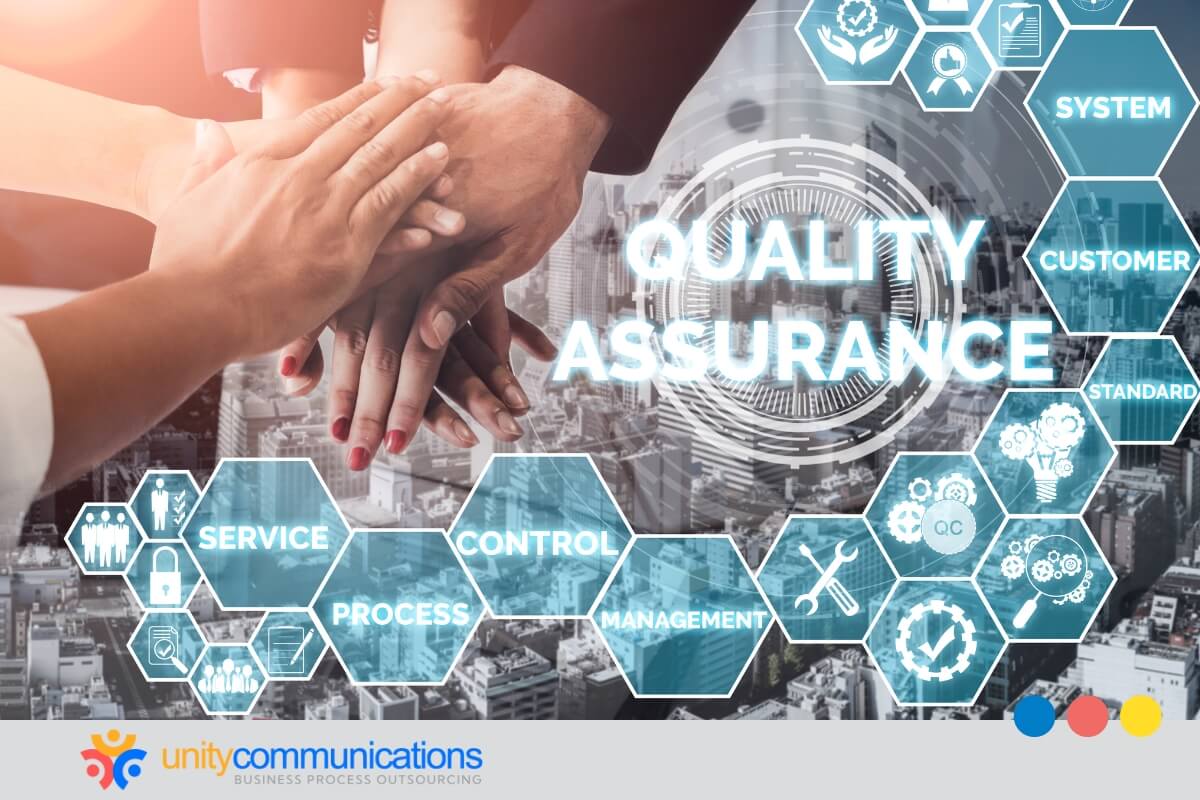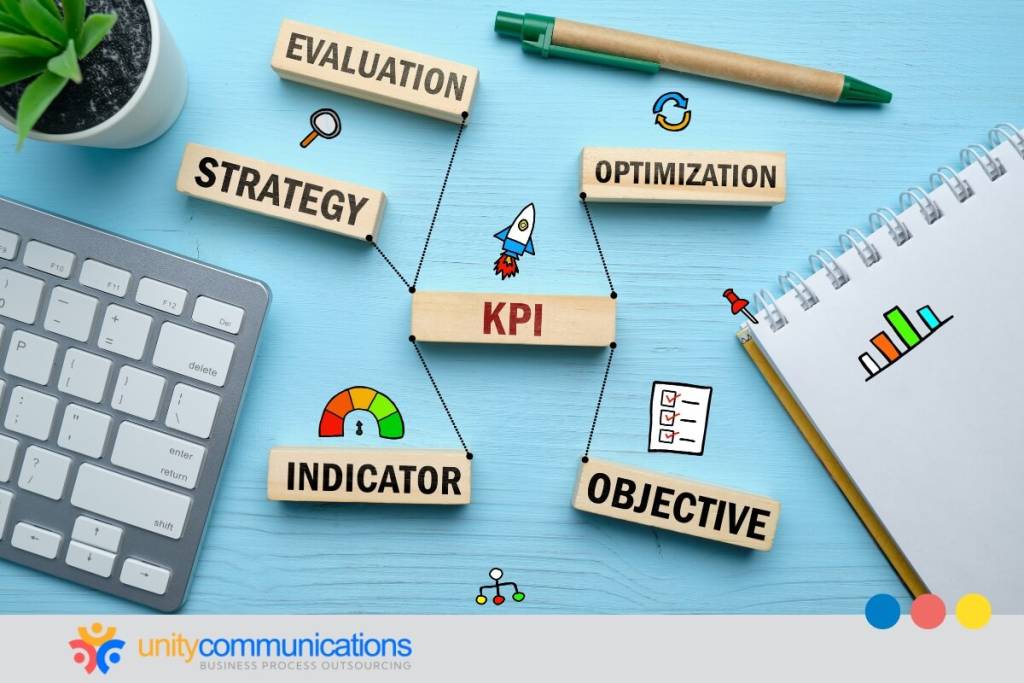Table of Contents
Running a business is like joining a race. When navigating complex market competition, you must calculate your speed, time, and effort. At every sharp turn and during regular quality assurance (QA) activities, you must meet your targets and key performance indicators (KPIs).
However, what if this function’s repetitive nature and massive data become unbearable?
Fret not! Artificial intelligence (AI) and business process outsourcing (BPO) work together to simplify your measurement of continued success. Combining advanced tech and human expertise boosts how you monitor your milestones.
Keep reading to learn how AI-powered KPIs and outsourced QA services supercharge your company, especially when working on software development tasks.
How AI-driven KPIs Improve Business Strategies

AI-powered KPIs use advanced machine learning (ML) algorithms and data analytics tools to accurately and comprehensively measure your business goals and achievements. This innovative approach lets you determine new KPIs or refine existing ones.
These insights help your team produce fresh ideas to improve your operations, products, and services. According to recent MIT Sloan Management Review research, 90% of polled businesses experience improvements after using AI to create new KPIs.
This improvement increases efficiency and brings higher financial benefits. It also fosters more precise and timely performance measurements. Explore how AI-based KPIs help drive business success:
- A South American retailer leveraged AI to streamline logistics. The company utilized an unsupervised AI model to generate new KPIs across nine countries. AI’s recommendations resulted in a 14% decrease in its logistics costs in the first 90 days.
- Google optimized AI to help clients improve finances and campaigns. The tech giant utilized unsupervised ML strategies to rank new KPIs and determine the most critical ones. After six months, the campaigns saw a 30-point performance improvement.
- DBS Bank adopted AI to monitor consumer journeys. The Singapore-based bank used the tech to identify and focus on KPIs influencing their desired customer and employee experience outcomes. Its profits before tax grew from approximately $5 billion in 2021 to over $6 billion in 2022.
- Wayfair used AI to reassess lost-sales KPIs for product substitution techniques. In the same MIT Sloan study, Wayfair found that consumers buying something else in the same product category caused 50%–60% of its lost sales. Hence, the company adjusted pricing, revamped product configurations, and reprioritized legacy KPIs.
- Bosch has developed AI-powered software to automate KPI monitoring. This capability gives the German multinational engineering firm real-time visibility into metrics covering manufacturing cycle times, facility energy consumption, and asset utilization. It uses the results to enhance its processes and accelerate decision-making.
The Importance of Outsourcing QA for Business Enhancement

Besides implementing AI-powered KPIs, businesses acquire outsourced QA services to save costs and accelerate time to market. Service providers offer cost-effective access to a well-trained QA team and modern technology.
Third-party vendors help ease your product testing processes and ensure high-quality outcomes, only charging an hourly or monthly fee. Other than that, here is what BPO specifically brings to the table:
- Provide unbiased and objective evaluation of products or services. External perspectives are crucial to identifying potential issues your in-house team might overlook due to familiarity with business offerings.
- Mitigate the risk of overlooking critical defects. A BPO team employs rigorous QA testing methodologies to reduce the likelihood of releasing goods or software products with significant flaws. This action prevents reputational damage or lowers customer satisfaction rates.
- Deliver flexible testing services. Outsourced QA units apply different trial approaches based on your project requirements, such as manual and automation testing. This flexibility ensures comprehensive testing coverage according to your urgent needs.
- Reduce management overhead. Keeping an in-house QA team adds to your admin tasks, employee performance evaluations, and compensation funds. Outsourcing QA eliminates these extra burdens, letting you focus on strategic decision-making.
- Automate QA processes. BPO firms use AI and ML solutions to streamline product and software testing. For instance, they incorporate these solutions into a cloud security platform’s trial to predict and resolve potential defect-prone areas before its official launch.
- Enable 24/7 testing cycles. BPO firms specializing in QA services work across different time zones. They can adjust to your business hours, resulting in faster testing turnaround times. Maximizing this capacity is beneficial when facing tight deadlines or operating in dynamic and fast-paced sectors.
- Provide scalable testing environments. BPO QA providers have access to various testing environments and tools. This capability makes testing apps or websites that require different browsers, operating systems, and devices easier.
- Highlight core competencies. Vendors let you focus on enhancing your primary projects while they take on your tedious QA tasks. For instance, your in-house team can concentrate on designing and customizing your new mobile app icons, templates, and other important features while the BPO team handles the trial phase.
What If AI-powered KPIs and Outsourced QA Combine?

Combining AI-powered KPIs and outsourced QA offers a cost-efficient way to quickly attain seamless quality. This technique helps address two significant roadblocks during quality testing: frequent requirement changes and insufficient time.
As discussed in the previous section, AI-based KPIs provide a data-driven foundation to transform your operations; the same goes for QA strategies. BPO QA teams use AI to align testing approaches with your most critical business objectives and areas of concern.
Furthermore, integrating AI and BPO results in more advanced test automation strategies. Providers optimize AI algorithms to generate smarter, self-adaptive test scripts. These scripts eliminate manual intervention, improving testing efficiency and turnaround time.
Suppose your financial technology (fintech) company aims to launch a new mobile banking application. You want this platform to be a one-stop hub for all financial services, from account management and customer service to secure online payments and transactions.
Due to your goal of launching the app within six months without spending considerable money, you hired a third-party development team. The provider unifies the following AI-powered KPIs and outsources QA techniques to ensure your app meets security standards and delivers superior customer experiences in the long term.
Functionality Testing
- The BPO team performs automated functional testing to identify and resolve potential app inefficiencies. These specialists use AI to test all critical functionalities across different devices and operating systems faster and more effectively.
- Meanwhile, third-party testers set and leverage AI-based KPIs to monitor the app’s real-time performance. These KPIs include response times, latency, and server loads. Doing so proactively identifies and addresses performance bottlenecks, ensuring a smooth and responsive app user experience.
Security and Regression Testing
- Outsourced QA specialists conduct robust security testing, including penetration trials and vulnerability assessments. They develop and maximize AI-powered security KPIs to continuously monitor potential threats and anomalies. This step keeps your app resilient against cyber threats in the long run.
- The BPO unit implements automated regression testing using AI-powered tools. Automation significantly expedites development and testing cycles without compromising quality. This effort ensures future updates and features do not introduce regressions or negatively impact existing app functionalities.
Client-focused Improvements
- Once the app goes live, the provider utilizes AI-powered KPIs to analyze user engagement metrics, such as app usage patterns. AI algorithms give the team real-time insights into how users interact with your mobile banking app. The data also provides recommendations on ways to improve user engagement and satisfaction.
- The third-party unit leverages AI-powered KPIs to monitor customer support interactions within the app. It also uses natural language processing (NLP) to analyze support tickets and chatbot interactions and identify common user issues. This information helps determine and develop necessary bug fixes.
Continuous Improvements
- The BPO company combines AI-enabled KPIs and analytics tools to continuously track your app’s performance. This proactive method lets the team detect and mitigate issues immediately, contributing to a more stable and reliable app.
- Outsourced QA experts utilize AI insights from KPIs and testing data to drive continuous app improvements. They use this AI to identify trends, patterns, and enhancement areas. This way, they know what to include when developing updates and new features based on the latest user needs.
The Bottom Line
Achieving business success starts with knowing and monitoring your KPIs through regular QA activities, especially when conducting software development and testing. These metrics and efforts determine whether you meet your targets or at least make progress.
Incorporating AI and outsourcing in this critical business function boosts productivity while saving costs. AI-powered KPIs and outsourced QA provide a more comprehensive view of areas that need prioritization and urgent improvement.
Let’s connect if you seek more clarifications on how AI-powered KPIs and outsourced QA can help maintain the quality of your products and services. Unity Communications has a pool of knowledge resources to help clear your confusion regarding this matter. The provider also houses experts and advanced solutions to help streamline your repetitive QA functions.




